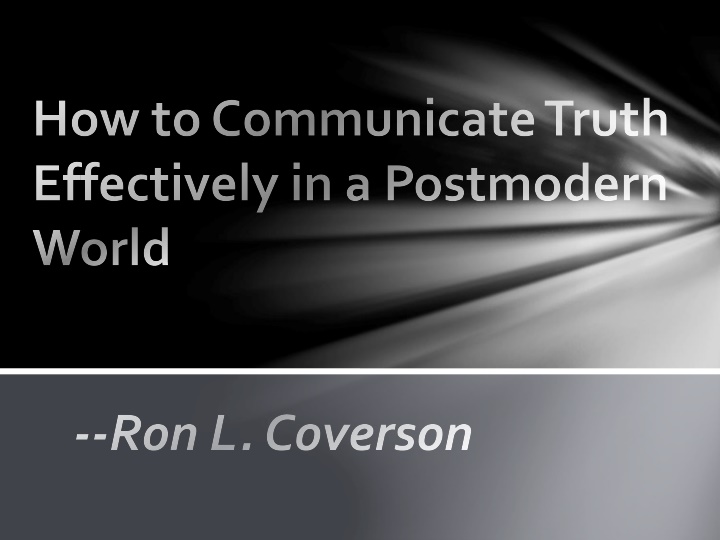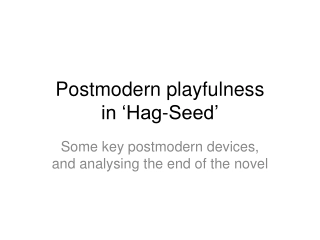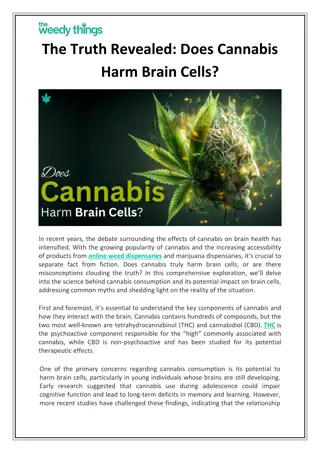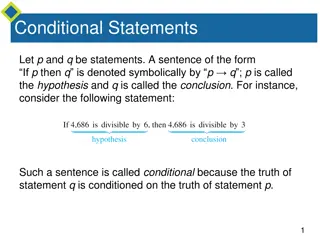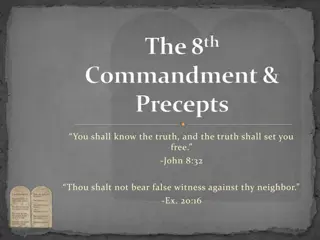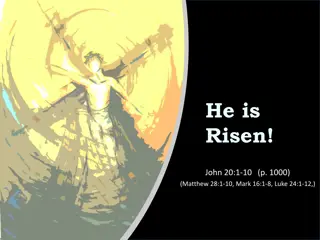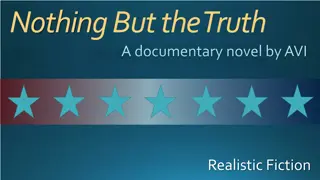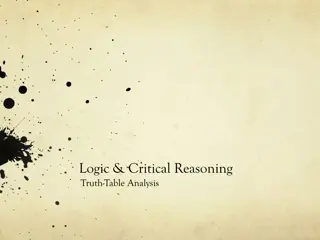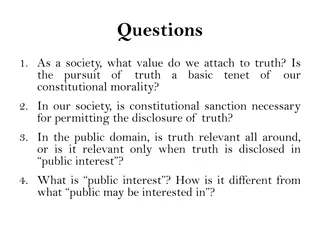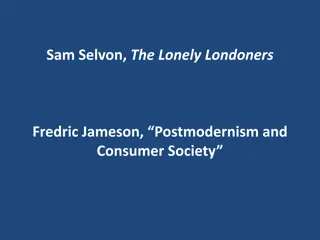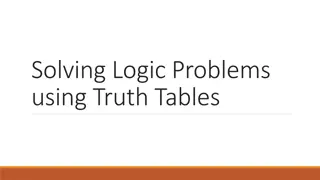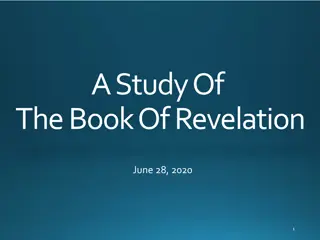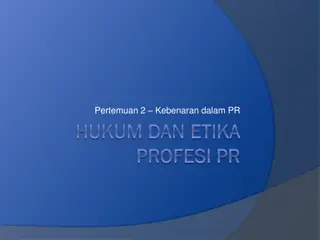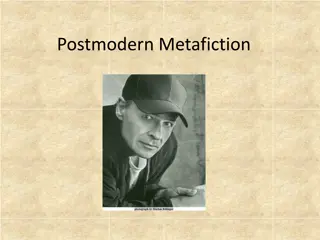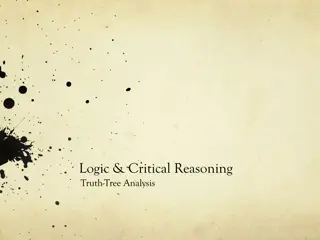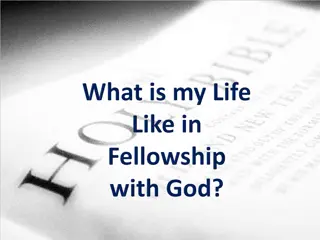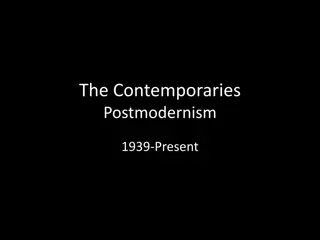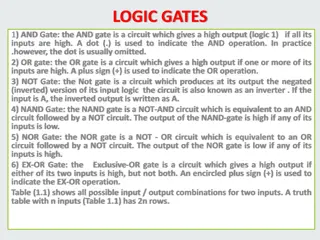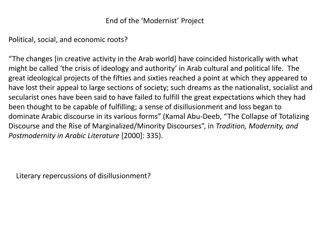How to Communicate Truth Effectively in a Postmodern World
Reacting to the idea of apriori Truth, postmodernism challenges traditional concepts of truth and self-identity. Explore how shifting perspectives shape communication in a complex world influenced by individual disillusionment and generational differences.
Download Presentation

Please find below an Image/Link to download the presentation.
The content on the website is provided AS IS for your information and personal use only. It may not be sold, licensed, or shared on other websites without obtaining consent from the author.If you encounter any issues during the download, it is possible that the publisher has removed the file from their server.
You are allowed to download the files provided on this website for personal or commercial use, subject to the condition that they are used lawfully. All files are the property of their respective owners.
The content on the website is provided AS IS for your information and personal use only. It may not be sold, licensed, or shared on other websites without obtaining consent from the author.
E N D
Presentation Transcript
How to Communicate Truth Effectively in a Postmodern World --Ron L. Coverson
Amazing grace, how sweet the sound That saved a stunted self-concept like me, I once was stressed out, but now am empowered, Was visually challenged, but now I see --Doug Marlett
Americas preeminent operating assumption We hold these truths to be self-evident, that all men are created equal, that they are endowed by the creator with certain unalienable Rights, that among these are Life, Liberty and the pursuit of Happiness.
Author Tim Jones recently had this to say about these iconic words that framed our nations constitution Pursuit of life, liberty and happiness should have read, the pursuit of truth, character, virtue and charity. Jones goes on to say that: Happiness is totally subjective, based primarily on egoism and individualism, whereas truth, virtue, and charity all focus on honesty (including self-honesty) and doing the right thing toward others rather than oneself. Character focuses on sacrifice rather than acquisition and accumulation.
Finally Jones surmises o The self in its pursuit of prosperity and pleasure is what the pursuit of happiness in the Declaration of Independence has come to mean. Again, Life, Liberty, and the pursuit of Happiness are natural derivatives that would automatically occur based on the way this all- important sentence should have been written, because it would have included this missing moral dimension as the leading objective for the new republic.
What is postmodernism? a) Simply stated, postmodernism is a reaction to apriori Truth; The notion that truth is an eternal idea that existed before creation. b) On an individual level, postmodernism is often demonstrated as a reaction born of the disillusionment experienced mostly by generation Xers and Millennials who have assessed the alleged hypercritical behavior of moderns (boomers and vets).
What is postmodernism? c) Ultimately, it is the inculcation in the 21st century of the philosophical determinations of the Enlightenment movement. d) Thus, the idea of living out truth is a philosophical concept. Today it manifests as so- called individual choice demonstrated by diverse ways of being in the world that may change (adapt or modify) based upon one s visceral sense of right and wrong that is unmoored from what might be called traditional values or mores.
Theologian David Wells described this phenomenon this way: Spirituality (for the postmodern) in a contemporary sense makes no truth claims and seeks no universal significance. It lives out its life within the confines of private experience. Truth is private, not public; it is for the individual, not for the universe. Here is American individualism on display, coupled with some new assumptions about God which are being glossed off with infatuations about pop therapy, uniting to produce varieties of spirituality as numerous as those who think of themselves as spiritual.
The threat postmodernism poses to the Christian s goal of living out Truth a)Postmodernism, born circa 1930 and unlike prior eras, is not theologically based and therefore not transcendent. Thus, it diminishes the idea that there is an objective or ethical standard that is derived from the God of the universe that has been deliberately and systematically revealed to mankind.
The threat postmodernism poses to the Christian s goal of living out Truth a) In historian Arnold Toynbee s Study of History he describes the postmodern era as one that marks the end of Western dominance and the decline of individualism, capitalism, and Christianity. b) In the absence of transcendent truth that is ethical and by definition objective, postmodernism establishes subjectivity as the singular way to determine what is true and what would lead to right or proper human action. Steven Connor, Postmodernist Culture (Oxford: Basil Blackwell, 1989), p.65.
The threat postmodernism poses to the Christian s goal of living out Truth a) When truth is subjectively determined, anyone who is able to acquire enough power is then able to determine what is true and thus what should be lived out privately and publically, not only for themselves but for all (collectivism). i) As Francis Schaefer once said: Either the Law is King or King is Law (subjectivity vs objectivity). ii) If a certain primary authority is the law, then the king or his administrators will determine the nature of right and wrong for all. iii)Thus all that is ethical, moral, legal or what is valued by a society is determined by the corresponding policies put forth by the king s administration iv)In a postmodern and secular society, subjective science fused with the arbitrary whims of the administration is determined to be the way that society s elected or appointed thought leaders create law and policy mostly out of thin air.
The Modern Mind a) Formulated in the eighteenth century by the Enlightenment philosophers: i) These concepts were comprised of at least three component parts of what moderns refer to as Reason: the objective sciences, naturalism s definition of morality and law, and the rational organization of living conditions and social relations. ii)Proponents of the enlightenment movement believed that the arts and sciences would further not only the control of the forces of nature but also the advancement of the understanding of self and the world we inhabit. Thus the birth of what today is known as progressive ideology: the idea that mankind does not need God and simply needs to master science and technology to control the environment and thus allow mankind to advance or progress in history for the good of all.
The Modern Mind i) This construct represents the birth or rebirth of a secular liberal religion akin to pantheism and framed by a Darwinist worldview, replete with all of its corresponding doctrines. Modernity, although informed by Judeo-Christian ethics, was not necessarily amenable to evangelical theology or transcendent truth. ii)Modernity consisted of the ideas of the Enlightenment movement that emphasized the evolution or progression of the human personality, intellect, and the applied sciences that fueled the industrial revolution. iii)Thus science, not the God of the Bible, is the god of Modernity while science and its sister technology are the gods of Postmodernity.
The Postmodern Mind a) Deconstructionist: the dismantling and redefining of literary terms and thus ideas for the purpose of reorienting people and things. b) Graphical: images are more powerful than words and thus redefine what we think and believe. c) Feeling oriented: Thus music/sight/sound are powerful influences (see the movies of Michael Mann). d) Guided by the values of popular culture and the cults of personality. e) Belief is not about right or wrong but rather about social consciousness born from a collectivist socio-economic context.
The Postmodern World Here, utility replaces duty; self-expression unseats authority, and being good becomes feeling good. --Robert N. Bellah Habits of the Heart
The Evangelical Mind a) The God of the Bible (Father, Son, and Holy Spirit) is the summon bonum of all things (see the Westminster Catechism) b) That Truth existed before creation in the form of the pre-incarnate Christ who is a Person who manifested himself 2000 years ago by the will of Father God in the form of Jesus Christ of Nazareth thus truth is transcendent. c) That man was set forth upon the earth to express His Image and manifest the will of God the Father from heaven. d) That mankind fell from Grace in Adam (Genesis 3) and thus in need of a savior namely Jesus Christ and a new model for how to live life God s Way (John 14:6).
The Contribution of the Reformation Lay in the confession of two thesis: 1. That the individual has access to the ultimate reality without the interposition of any intermediaries save for the Word written and living, and 2. that the truth must be held in tension with the reality of the corruption of the human being.
The Evangelical Mind a) That Truth and righteous-living is known by general revelation of the will of God by virtue of the Law of Moses (The Ten Commandments) that informs mankind and addresses the condition of fallen man. b) That Truth and holy living (sanctification) is a product of special revelation that is only derived through the salvific experience by faith in the saving work of Jesus Christ and the corresponding grace-based life found only in Him. c) That Christians should live out their lives in community (The Church) as part of a called out family of Kingdom Citizens (disciples) who are being equipped and made ready to engage the culture for Christ according to their gifts, calling, and sphere of influence.
Advantage Christian An outside God, such as we find in biblical faith, is comprehensible because he is self-defined in his revelation; the inside god is not. The inside god is merged into the psychological texture of the seeker and found spread within the vagaries of the self. --David Wells, Above all Powers
Advantage Christians 1) The great opportunity before us is to develop the skills and competencies to communicate transcendent truth to individuals and groups living in a postmodern world. a) Although postmoderns by definition wear a different pair of glasses (paradigms), God rigged the inner man with his Image, thus God s Word of Power is able to penetrate the thoughts and intentions of the heart to reach the longing of a man or woman s soul. (Heb. 4:12)
Advantage Christian Western man fools himself when he thinks he has outgrown religion and thinks that he has no need of God as he is learning in the bitter Nemesis to his pretensions to self sufficiency. --Victor White In other words Sin is Sand in the Gears of Life
Advantage Christian What is held in common across the broad spectrum of spiritual yearning is the desire to find the Real in the midst of the mundane, to look beyond or beneath the surface of modernized life with its hard-driving commerce, its fatuous slogans, its glossy images, crowded thoroughfares, and relentless pressures, and find connection to something much more meaningful. David Wells, Above All Powers
Fundamentals of Engagement OTHERS YOU Conditions of life (Permanent White Water)
The Tough Work of Trust... Trust can be messy, painful, difficult to achieve, and easy to violate. Trust is tough because it is always linked to vulnerability, conflict, and ambiguity (the unsure place). Vulnerability is a precondition of trust. Before any two people can form a personal bond, they must first open themselves up, let each other know where they stand. But that creates the possibility of disagreement and conflict. Indeed, healthy conflict is a sign of the existence of trust in formation.
The Tough Work of Trust... It shows that two people care enough about what they are doing together to disagree. Finally, trust acknowledges the inevitability of ambiguity. No two people will necessarily see the same thing at the same time, or have the same feelings about it. Trust admits to that ambiguity and strives to negotiate it. Alan Webber Founderof Fast Company a New Economy Publication
Trust fCredibility + Rapport Risk
Trust fCredibility + Rapport Risk
How best to communicate truth in a postmodern world 1) First for Individuals: a) Modeling the Way of Jesus (John 14: 6) i) Be the Truth you are advocating. ii)Do the Life things you believe to be transcendent and real. iii)Have the blessings of transformational living (Rom. 12:1, 2) and share those blessings with others. b) Speak the Truth in Love (Eph. 4:15, Gal. 5:6)
How best to communicate truth in a postmodern world 1) First for Individuals: a) Engage in public conversations by using the skill of dialogue i) Seek first to understand then to be understood (Stephen Covey). ii) Find common ground and gain agreement iii)Build the relationship by spending time serving them in their world, as long as it does not compromise your walk. iv)Use the power of questions to keep the dialogue moving in the right direction toward their personal accountability with the God who made them, knows them, and desires a personal relationship with them.
Trust Building Communication Process Mutual Understanding Agreements Feedback
How best to communicate truth in a postmodern world For Groups: a) Create forums that emphasize dialogue and civil engagement b) Utilize the power of ground rules c) Speak to them in parables (Matthew 13) i) Use personal stories, examples of God s transformational touch on tribes, tongues, kindred s, and nations. ii) Don t be afraid to acknowledge the abuses of those who have done evil in the name of the Lord. d) Leave them with powerful questions e) Trust the Holy Spirit to do His work by being honest, open, and transparent (HOT). f) Support them with biblical resources that are founded in reliable Christian Worldview (doctrine). g) Pray for them ceaselessly! h) Be there for them when they call on you.
